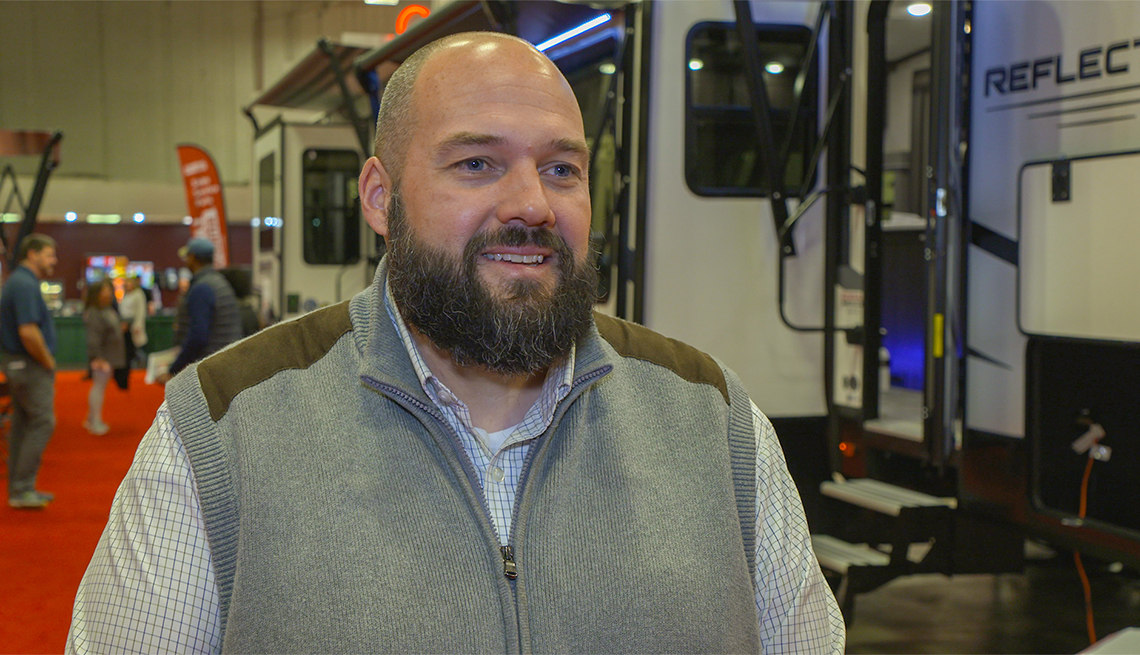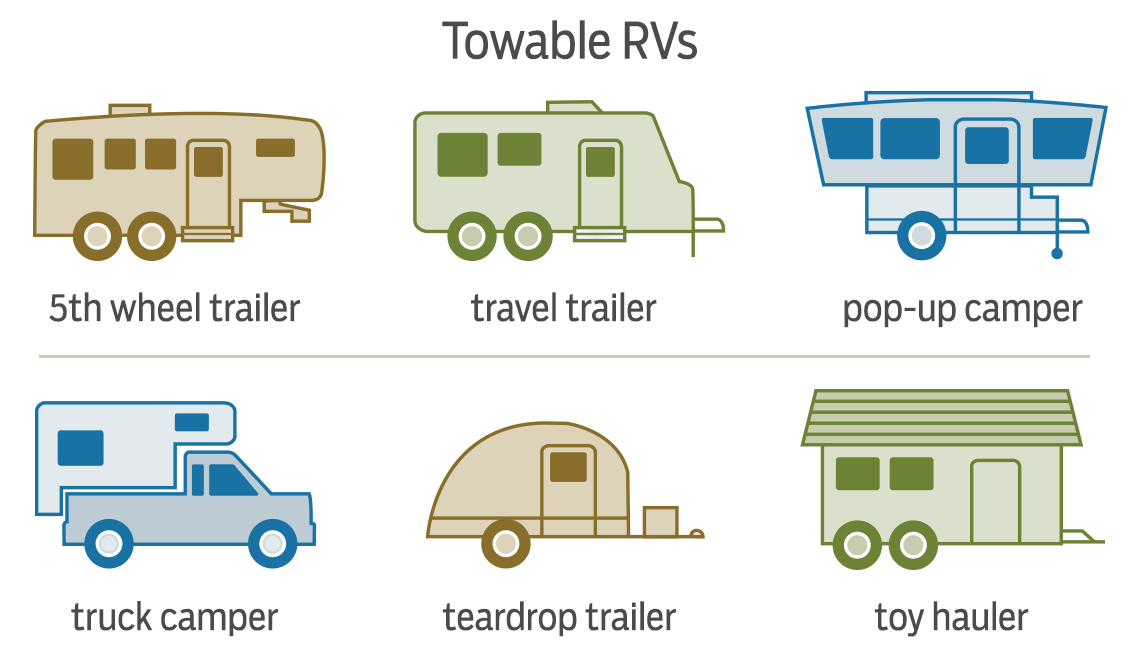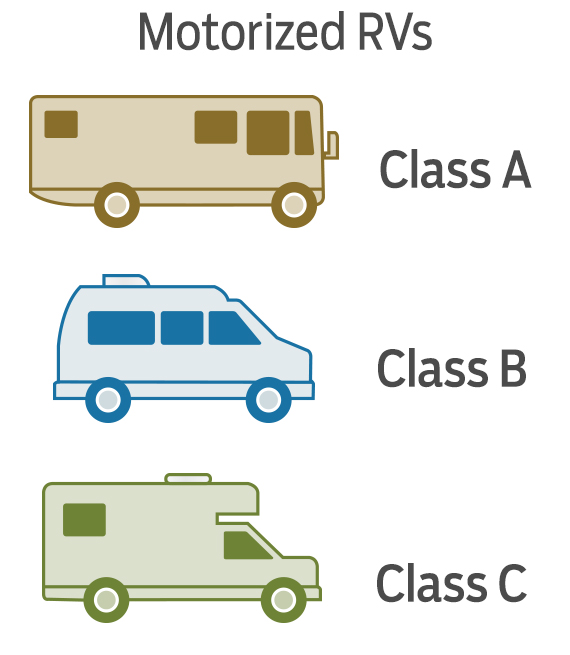Thinking About Buying an RV When You Retire?
An expert on recreational vehicles explains what you need to know before you hit the open road

AARP
Jeremy Puglisi, cohost of the 'RV Travel Atlas' podcast and coauthor of 'Idiot's Guides: RV Vacations.'
En español | Retiring to the RV life can be tempting, whether you plan to live in your recreational vehicle for long stretches or simply use it for short vacations. Either way, it's important to remember that an RV is a sizable investment. While a pop-up camper costs just a few thousand dollars, a tricked-out motor home with all the bells and whistles can run a half-million or more. We asked Jeremy Puglisi, cohost of the RV Travel Atlas podcast and coauthor of Idiot's Guides: RV Vacations, to shed some light on the realities of RV ownership. Here's what he had to say.
What do you need to think about before buying an RV?
Ask yourself if you want a motor home [that you drive] or something like a travel trailer [that you tow behind a truck]. We often tell people if you have a truck already, you might get that towable because you've spent a lot of the money already. I have a $40,000 truck and a $30,000 RV. Put that together, that's $70,000. I could have bought a motor home, but I like my pickup truck.
A second big thing you really need to think through is how big of an RV do you want. A lot of people, particularly if you're thinking of moving into the RV or retiring, could be tempted to buy a really big 40-foot RV because you want the space. But you need to consider that you might have a harder time getting into some campsites.
What else should you consider in an RV for retirement?
If you're retired and you're going to be living in the RV or taking really long trips, you want something that will fit all seasons and can be used in different weather temperatures. A lot of RV dealers will say an RV is a four season, but then it's really not that well insulated. There is a lot of good information on YouTube and online to find a good four-season RV and what companies truly make RVs for any type of weather.
Of the different classes and types of RVs, you have towables, which would include pop-up campers, but somebody retiring is probably not retiring into a pop-up camper. There is the traditional travel trailer, maybe something like an Airstream. You also have the “fifth wheels,” known as the Cadillac of the RV world. They're very residential, they're very luxurious. They're like second homes. So, if I was retiring and wanting a towable, I personally would be looking at a fifth wheel.
How about motor homes?
For motor homes you have Class A's, which look like a bus, for lack of a better description. There's no bed over the driving area, so you've got a big cockpit with the huge window. Then there's Class C's that have the big bed over the driving area. Those are great options, too, if you're retiring or spending a lot of time in an RV. Then also we have Class B's, which are like vans. So, you need to decide if you could survive on that limited amount of space.
What can you say about maintenance costs?
Towables don't have a lot of maintenance costs since they don't have engines. You have to winterize them and pack wheel bearings [to prevent rusting], which you can do yourself. Now, when you're buying a motor home, you have an engine; there's going to be all the maintenance that comes with that. Certain motor homes will need to be serviced at the RV dealership for a very specific type of oil change; others, such as a Class C with the 4450 chassis, could be taken to your Ford dealership. But even those oil changes can add up.
Gas or diesel?
Most people will say that the diesel is more durable and lasts longer. It has more maintenance costs, but it also performs better at higher elevations in the mountains. Gas engines can be really good, too, but the general age-old wisdom in the RV industry is that diesel is a better investment, doesn't depreciate as much, and it will last long.
What do you look for in an RV dealership?
You want to pick a good dealership. Sometimes we say picking a good dealership is just as important as picking a good RV. Find a dealership that has been around, maybe family owned, with lots of experience. Check how many service bays there are. If there are no maintenance bays, that's a warning sign to get out of there.
How hard is it to drive an RV?
I find the Class C is very easy to drive. Now, I've driven Class A's, and I think that they were a little harder to drive. I would recommend taking lessons for a Class A; a good dealer will offer lessons. If you've driven a U-Haul, you're good to go with a Class C. A Class B is basically a van. If you're towing an RV, I was intimidated at first, but after a few weeks I felt very comfortable.
You might just not want to get a massive RV. If you go up to a 40-foot RV, it's going to be a little bit more intimidating to tow. If you keep it at more like 30 feet or 28 feet [long], which is plenty of room for retired couple traveling, it's going to be easier to back up and park.
What would you recommend as a first trip in your new RV? The Grand Canyon?
I think that you should camp close to home the first trip. Do a little shakedown trip somewhere boring, 10 minutes from the house. Learn all the systems of the RV and do a couple little trips before heading out on that really big adventure you're dreaming about. You don't want to discover a problem with the RV when you're somewhere beautiful like Glacier National Park — you don't want to be messing around with your plumbing system there.
Some questions and answers have been edited for length and clarity.



